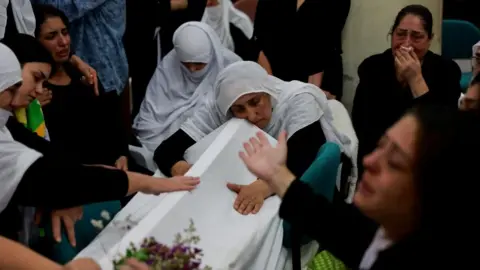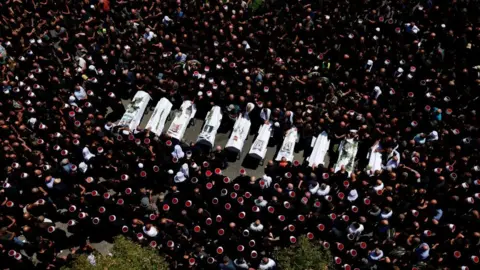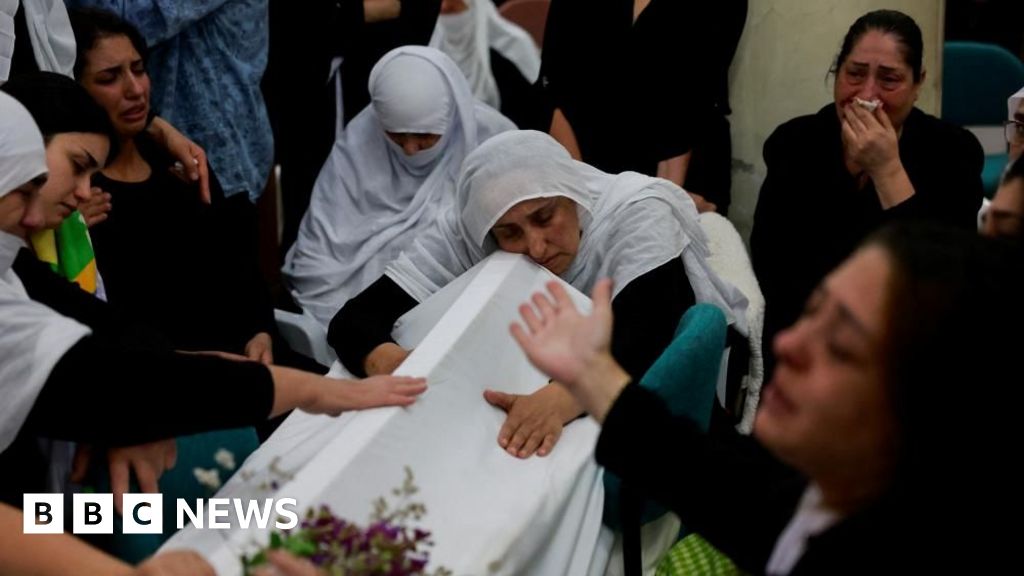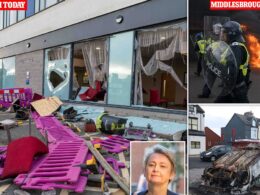Golan Heights air strike: ‘The whole town is mourning’
The scene around the football pitch here in Majdal Shams, where 12 children and young people died on Saturday, is quiet and deeply sombre.
There are plenty of people here – local Druze elders in their distinctive red and white turbans and baggy trousers, military officials, visiting government ministers and of course many journalists.
But conversations around the crater where the rocket landed are hushed, respectful.
A black flag flies at the spot where the rocket landed last night, gouging a shallow crater in the pitch and blowing out the metal fence around it. There are shrapnel holes everywhere.
Wreaths have just been laid. Many people are simply standing by the crater, taking in the scene, lost in thought.
In the corner of the pitch, someone has tried to remove the bloodstains on the astroturf, but with only limited success.
Outside the fence, bicycles and scooters lie scattered, all blackened from yesterday’s brief but devastating fireball.
There’s a bomb shelter metres away, but when the siren sounded last night, the children had mere seconds to respond. They had absolutely no chance.
Israel says the rocket was fired from Shebaa, a small village just a short distance away across the western flank of Mt Hermon, which towers over Majdal Shams.
Hezbollah disputes Israel’s claim, but around the time the rocket landed here, its media outlets announced that it had fired rockets towards an Israeli military base less than two miles from the football pitch.
 Reuters
ReutersThis is a day of funerals for those who died here, most of them boys and girls between 10 and 16. Grief hangs heavy in the summer heat.
A voice is briefly raised, furious and urgent.
“How come there’s still a Beirut?” he cries. “We’ve had 10 months of our children living in fear.”
There’s a ripple of applause, but opinion here in this Druze minority town is divided on how forcefully Israel should respond. After almost 10 months of simmering conflict, the prospect of an all-out war scares many.
When Bezalel Smotrich, Israel’s hardline finance minister, arrives, the crowd swells and the sense of anger mounts.
He’s accosted by angry locals. Some are demanding a decisive response against Hezbollah. Some accuse the government of abandoning the Golan Heights.
Mr Smotrich tries to offer his condolences, even to hug those around him. But it seems not everyone is interested in his sympathy.
In the middle of a large adjacent football pitch, 12 empty black chairs commemorate the lost.
Fighting back the tears, 26-year-old Ugarit Abu Assad, from nearby Buqata, says she fears a major escalation.
“I’m afraid of the consequences of all out war,” she says. “A lot of people are going to die.”
Walking around the steep streets of this mountain community, the sense of collective shock and mourning is overwhelming.
Small groups of men, women and children, all dressed in black, are moving around silently, from one grieving household to another.
Sometimes you catch sight of people hugging or wiping away each other’s tears.
Wahim, a teacher who knew many of the young victims, was utterly distraught, unsure whether to try to express his feelings or stay silent.
“This is a disaster. How do I even start,” he said, before apologising and dissolving into sobs.
Ivan Ebrahim pulled up a picture of his 10-year-old cousin, Milar Shaar, the youngest victim. A boy who loved football and gaming.
“He is the greatest kid here. Everybody loved him,” Ivan said.
“I don’t know. It’s hard to describe.”
“We haven’t slept since yesterday,” Milar’s uncle, Nassar Ebrahim tells me. “The whole town is in mourning.”
 Reuters
ReutersThe people of Majdal Shams are used to the sound of rockets overhead, but Saturday’s attack took them all by surprise.
“I don’t think the government needs to respond,” Nassar says. “They need to end the war, so no-one dies on either side.”
The mood up here, away from the occasional angry outbursts down at the football pitch, is extremely subdued.
But this is a part of the world where hospitality runs deep.
A group of young men call us over, offering water thimbles of strong coffee.
They’re determined to stay put, despite the danger.
“We Druze don’t leave our homes,” one tells me, echoing a quiet defiance we encounter elsewhere.
When it comes to what happens next, they’re unanimous: they don’t want a wider war.
“The children here, the children in Lebanon, the children in Gaza. They don’t need more war,” another says.








